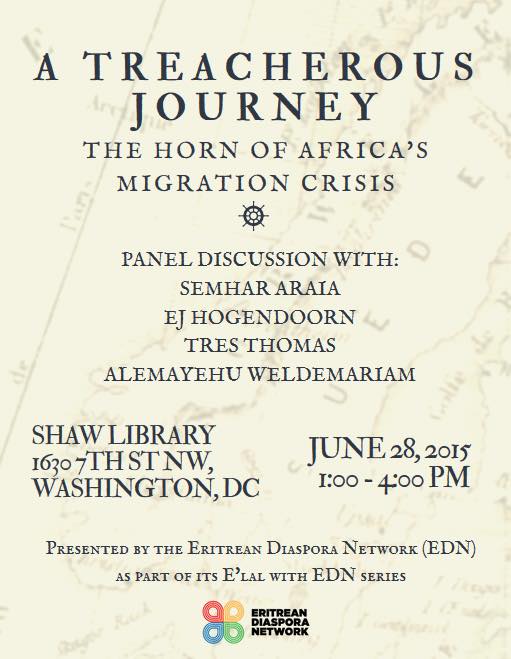On June 28, 2015 the Eritrean Diaspora Network (EDN) hosted a panel discussion titled “A Treacherous Journey: The Horn of Africa’s Migration Crisis.” The event was held at the Shaw Library in Washington DC, and involved four panelists: Semhar Araia (Semai Consulting/ DAWN), EJ Hogendoorn (International Crisis Group), Tres Thomas (SomaliaNewsroom/George Mason), Alemayehu Weldemariam (George Mason). The event lasted two hours, and began with Q&A between the panelists and an EDN moderator, followed by questions from the audience. The audience was a large and diverse group primarily from the Horn of Africa. The quality of our panelists and our audience made for a dynamic and engaging conversation.
The panel discussion had three major objectives. The first was to raise awareness about the Horn of Africa’s ongoing migration crisis by using the expertise of the panelists to inform and broaden the knowledge base of the audience. In other words, the panel had a clear educational goal. The second objective was to generate some ideas about how the Horn’s diaspora can play a more proactive role in ending the migration crisis. The third objective was to generate a regional perspective on this crisis, so that the Eritrean, Ethiopian, and Somali diaspora’s could find some common ground upon which to unite for positive change.
In keeping with the EDN’s mission, the discussion was balanced and non-partisan. Political issues were discussed, but with a conscious effort to identify areas of consensus. While it is impossible to summarize a discussion of this size, several common themes emerged. One major theme was that although the issue of migration manifests itself in similar ways across the Horn, each country has a unique context and history that needs to be understood in creating solutions. There can be no one-size-fits all model to address the migration crisis, although cross-national alliances are important. A second theme was that while the diaspora can play in important role in remedying the crisis, migration is complex phenomenon that will require the support of many other actors—including governments, NGO’s, civil society, and international organizations. In other words, the diaspora must build alliances and networks within the broader societies in which they reside. A third theme that emerged was that while the migration crisis is too important to ignore, migration, in one form or another, will remain a fact of life throughout the Horn for years to come. This reality necessitates securing legal and safe channels for those that seek to move out of the region in a way that both protects the interests of countries in the Horn, but also the industrialized states to which many of the Horn’s citizens will migrate.
All in all, it was vibrant and dynamic afternoon, and EDN sincerely thanks all those who attended. A special thanks goes out to the four panelists for sharing their expertise. EDN hopes to continue engaging the Eritrean diaspora on refugee and migration related issues. Please feel free to contact us if you would like to support EDN programming in these areas.


what could we say, about Eritrean students who wants to study in universities but not get chance?